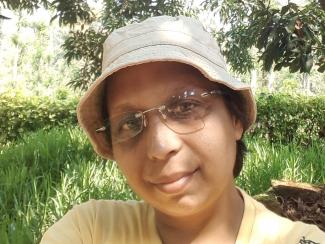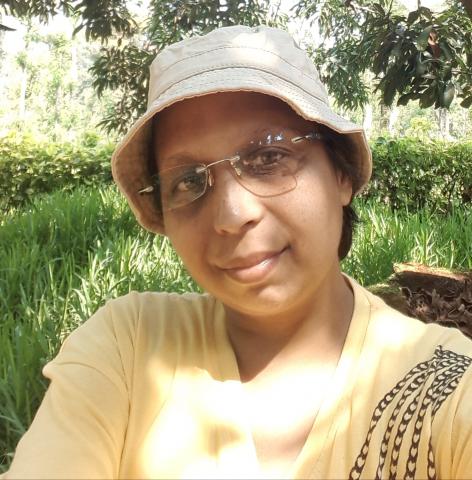
Namitha A Kumar, living with thalassemia intermedia, points out that thalassemia is more burdensome for girls and women because of additional hormonal disruptions, chronic pain and issues like amenorrhea, hypogonadism, osteopenia and osteoporosis. Read her personal story and her commitment to prevention advocacy and timely interventions.
I am a warrior with thalassemia intermedia living with this condition since the age of 4. I was diagnosed at the age of 4 and since then been on regular blood transfusions, iron chelation and other therapies. Though I had my fair share of childhood illnesses and complications, I pretty much lived like any other child. My family ensured that I was no different from others so I ended up playing games, doing sports, falling, breaking a few bones, going for holidays, trekking in the wild and generally doing everything that a child does.
Treated no differently in school and college
From an early age, I realized I had a medical condition and had to be careful but that didn’t stop my normal activities. I was just a bit more cautious. Though my school and teachers were informed about my condition, I was treated no differently thankfully. I had to turn in my homework and do everything that my classmates did and I am really thankful to my school for shaping me in this way. They were empathetic and often gave me leeway when I was sick but otherwise held me accountable to be a good student. I finished my ICSE smoothly.
I went to college like anybody else. Again, the college and faculty were informed about my condition and they supported me just like they did in school. In fact, they pushed me to achieve more academically and motivated me at every step. I ended up getting the first rank for the university in my Master’s with three gold medals. All along I had lovely classmates whether at school or college who knew about my condition and helped me when I needed support.
Endocrine complications for females
Thalassemia first hit me badly after my Master’s degree when a simple fall from a bike led to a hip fracture which needed a surgery with screws. For the first time I started to learn more about endocrine complications for females. It struck me hard that girls and women with thalassemia are hit harder by endocrine issues simply because of the physiology and hormonal balance. Excess iron can damage all the endocrine glands right from the ovaries to the pancreas, thyroid and the master gland – pituitary in the brain.
I started studying how iron affects the female endocrine system and disrupts all the reproductive hormones like follicle-stimulating hormone, gonadotropin-releasing hormone, luteinizing hormone, estrogen and progesterone. With the help of my endocrinologist, I went through a series of tests to check if there was any damage to my pituitary gland. Thankfully I escaped damage to the hypothalamic pituitary axis (HPH).
I had weak bones simply because low estrogen levels affect calcium and vitamin D3 uptake. I started medications to correct the low estrogen levels as well as improve calcium and vitamin D3 uptake. However, some damage was already done as I had played hooky and not been compliant with iron chelation during my college days. This is something I regret even till today. I had not bothered to understand and study much about thalassemia in my college days and went about like an ostrich with my head in sand. Had I known that such complications occur, I would have been absolutely compliant. But it was a little late. I managed to salvage what I had and prevent further damage.
My endocrine disruption
Currently, I regularly do my entire hormone profile every 3 months which includes serum estradiol, serum cortisol, T3, T4, TSH, blood glucose both fasting and post-prandial and serum fructosamine. I also regularly check my serum calcium and vitamin D3 levels and also do a DEXA scan every year to check bone mineral density. I consider myself lucky to be able to afford quality healthcare and I am aware and deeply sensitive to the fact that a lot of girls and women with thalassemia do not have access to such healthcare. It is painful to see other girls and women suffer without getting proper care. Endocrine damage is irreversible and the only thing is prevention.
Along the way, I also managed to do my PhD at the National Institute of Advanced Studies, Bangalore where I found the most wonderful supportive faculty, batchmates and seniors. It is this period which sparked off my entry into patient advocacy and activism to improve care for people with thalassemia. I currently work as head of communication and advocacy for a healthcare not-for-profit – Open Platform for Orphan Diseases.
Started ThalGals support group
My saga with endocrine disruption continues and I am still on hormone supplements to correct the deficit. I started a social group called “ThalGals” for us girls and women to discuss our endocrine issues like amenorrhea, hypogonadism, hypothyroidism, diabetes, osteoporosis etc. Many issues which we can’t discuss in the general thalassemia groups are discussed here freely. We have a safe space to share our problems and get help from our peers. Peer support is very important for girls and women with thalassemia. We cannot battle it out alone. My take is history should not repeat itself. What happened to me should not happen to other girls and women so I share my issues with them to help them take preventive measures to catch it early and get timely interventions.
Gender gap in thalassemia care
In my many interactions with girls and women with thalassemia across India, it struck me that there is a clear gender gap in healthcare. I started realizing that boys with thalassemia get better care and support than girls with thalassemia. In my conversations with parents of girls with thalassemia, there is always the worry of marriage and producing children at the back of their minds. They tell me, “How to get a girl with thalassemia married? Will she be able to have children?” As a society we are so obsessed with the double-edged knife – marriage and motherhood that it has surpassed all other goals for girls and women. I tell the parents not to worry about marriage and children for their daughters but worry about their careers and make them financially independent. Once they are financially independent, they will be able to pay for their own healthcare and also develop a network of professionals and soon enough they may find their own life partners. The point is not to force them into a situation where their bodies may not be able to cope with the demands of marriage and motherhood. Let them decide if they can take on these roles or not.
Another important point that struck me was most of our clinicians were males be it hematologists or endocrinologists. Of course, they were well aware of how thalassemia affects the female endocrine system and treated us accordingly. However sweet they were to us, some of us were uncomfortable discussing our concerns with them. Thankfully some of us have found a female endocrinologist in North Bangalore. This has put many of our girls and women at ease to freely discuss issues without any hesitation.
Physical woes of women with Thal
Living with a chronic condition is not an easy journey for anybody but it becomes all the more burdensome for girls and women because of additional hormonal disruptions, chronic pain and issues like amenorrhea which can lead to osteopenia and osteoporosis. To add to the physical woes, is the societal burden of expectations that girls will ultimately get married and reproduce. All girls and women with thalassemia and our mothers need to stand united to challenge these gender stereotypes and do what works for us at an individual level. Every girl is not interested in marriage or producing children. We need to take off the coloured glasses and accept individual choices and let people lead their lives the way they want.
Despite all these challenges, I still feel our girls and women with thalassemia have done well for themselves. We have lawyers, teachers, college faculty, engineers, accountants amongst us and constantly strive to push for education for all our girls and women.
Collectively we want our respective state and central governments to recognize the gender gap in healthcare for thalassemia and provide special measures in government hospitals giving girls and women access to quality gynaecological and endocrine care. We need to prevent serious endocrine complications in girls and women before it gets out of control. The idea of a ThalGal group is to try to raise awareness and give the right information to girls and women at the right time. This fits in with this year’s International Thalassemia Day theme “Be Aware. Share. Care: Working with the global community as one to improve thalassaemia knowledge.”
You can reach @ThalGalPower on twitter

**With deep regret we would like to inform that Namitha A Kumar passed away on 10th May 2025. But the experience and lessons she shared will continue to support many persons living with Thalassemia. And we will always be grateful for her willingness to share.
You can see our obit on Namitha :
https://www.instagram.com/p/DJejv_Wyd9F/?igsh=MTc5MXhqaWI2eXg2cQ==
https://www.linkedin.com/posts/patientsengage_we-first-connected-with-n…






